
Berea College is a private liberal arts work college in Berea, Kentucky. Founded in 1855, Berea College was the first college in the Southern United States to be coeducational and racially integrated. It was integrated from as early as 1866 until 1904, and again after 1954.

Antioch University is a private university with multiple campuses in the United States and online programs. It is the offshoot of Antioch College, which was founded in 1852. Antioch College's first president was politician, abolitionist, and education reformer Horace Mann. In 1977, the College network was re-incorporated as Antioch University to reflect its growth across the country into numerous graduate education programs. It operates four campuses located in three states, as well as an online division and the Graduate School of Leadership and Change. All campuses of the university are regionally accredited by the Higher Learning Commission.

Deep Springs College is a private junior college in Deep Springs, California. With the number of undergraduates restricted to 26, the college is one of the smallest institutions of higher education in the United States. In L. Jackson Newell's 1982 assessment of Deep Springs College, he states that it "ranks second among the nation's institutions of higher learning with respect to the aptitude of the students it admits". Though it offers an associate degree, most students transfer into a four-year college after completing their studies. Those enrolled pay no tuition and are given room and board.
Cooperative education is a structured method of combining classroom-based education with practical work experience.
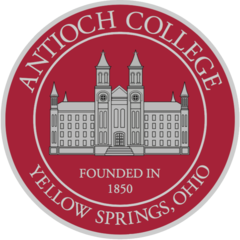
Antioch College is a private liberal arts college in Yellow Springs, Ohio. Founded in 1850 by the Christian Connection, the college began operating in 1852 as a non-sectarian institution; politician and education reformer Horace Mann was its first president.
The Five Colleges of Ohio, Inc. is an American academic and administrative consortium of five private liberal arts colleges in the state of Ohio. It is a nonprofit educational consortium established in 1995 to promote the broad educational and cultural objectives of its member institutions.

Baldwin Wallace University (BW) is a private university in Berea, Ohio. Established in 1845 as Baldwin Institute by Methodist businessman John Baldwin, it merged with nearby German Wallace College in 1913 to become Baldwin-Wallace College.

The University of Minnesota Crookston (UMN–Crookston) is a public college in Crookston, Minnesota. One of five campuses in the University of Minnesota system, UMN Crookston had a fall 2022 enrollment of 1,489 undergraduate students. Students come from 20 countries and 40 states.
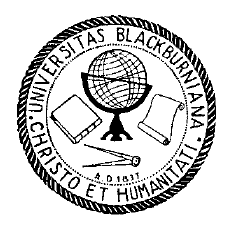
Blackburn College is a private college in Carlinville, Illinois. It was established in 1837 and named for Gideon Blackburn. The college is affiliated with the Presbyterian Church (USA).

The National Labor College was a college for union members and their families, union leaders and union staff in Silver Spring, Maryland. Established as a training center by the AFL–CIO in 1969 to strengthen union member education and organizing skills, NLC became a degree-granting college in 1997 and in March 2004 gained accreditation from the Middle States Commission on Higher Education. Until the college closed on April 26, 2014, it was the only college of its kind in the United States.
An online degree is an academic degree that can be earned primarily or entirely through the use of an Internet-connected computer, rather than attending college in a traditional campus setting. Improvements in technology, the increasing use of the Internet worldwide, and the need for people to have flexible school schedules while they are working have led to a proliferation of online colleges that award associate, bachelor's, master's, and doctoral degrees.

Antioch University Midwest (AUM) was the name of a campus of a private institution of higher education serving adult students in Yellow Springs, Ohio. Previously the campus was named "Antioch University McGregor" after the management professor and theorist Douglas McGregor, who served as the President of Antioch College from 1948 to 1954. On June 12, 2010, the campus was officially renamed "Antioch University Midwest."
Transfer credit, credit transfer, and advanced standing are the terms used by colleges and universities for the procedure of granting credit to a student for educational experiences or courses undertaken at another institution. This is a subset of recognition of prior learning.
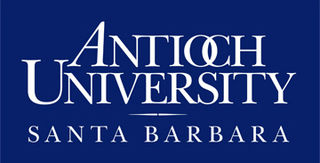
Antioch University Santa Barbara (AUSB) is a private liberal arts university in downtown Santa Barbara, California. It is part of the Antioch University system that includes campuses in Keene, New Hampshire; Seattle, Washington; Los Angeles, California; and Yellow Springs, Ohio, also home to Antioch College. Antioch University has operated in Santa Barbara since 1977.
An open textbook is a textbook licensed under an open license, and made available online to be freely used by students, teachers and members of the public. Many open textbooks are distributed in either print, e-book, or audio formats that may be downloaded or purchased at little or no cost.
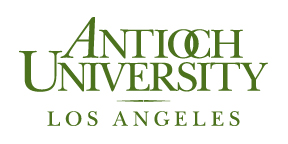
Antioch University Los Angeles (AULA) is a campus of Antioch University in Culver City, California.
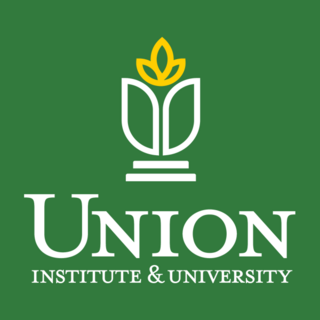
Union Institute & University (UI&U) is a private online university with its headquarters in Cincinnati, Ohio. The university is accredited by the Higher Learning Commission and operates satellite campuses in Florida and California. Since early 2023, it has been experiencing severe financial challenges. Federal financial aid has been cut off, it has not paid employees, and it has been evicted from its headquarters in Cincinnati for failing to pay rent.
A manual labor college was a type of school in the United States, primarily between 1825 and 1860, in which work, usually agricultural or mechanical, supplemented academic activity.

Joan Straumanis is an academic administrator, philosopher, second-wave feminist, mathematician, civil libertarian, public speaker, and American pioneer in women's studies. She co-created the first women's studies program outside a public university, and served as president of both Antioch College and the Metropolitan College of New York and as academic dean at other institutions.
History of education in Kentucky covers education at all levels from the late 18th century to the early 21st century. The frontier state was slow to build an educational system. In K–12 and higher education, Kentucky consistently has ranked toward the bottom of national rankings in terms of funding, literacy levels, and student performance. Inside the state the Appalachian region always lagged. The Bluegrass area, however, built a strong reputation in higher education.











